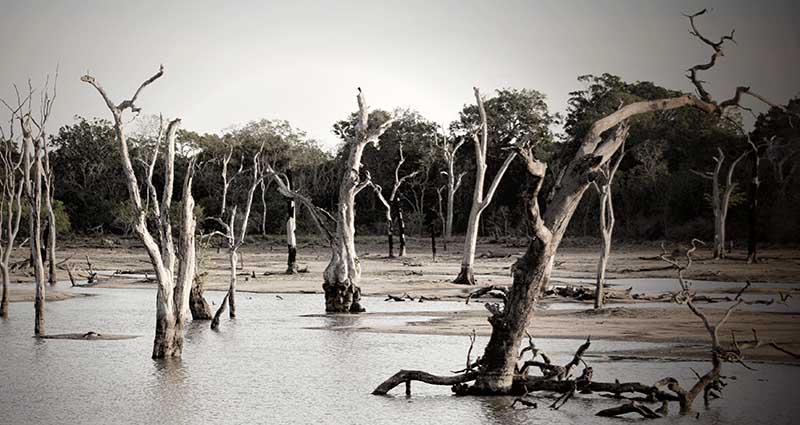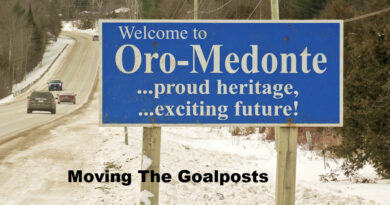Think Globally, Act Locally
By John Swartz
Members of the Sustainable Orillia group, Ellen Field and Fred Larsen, made a deputation to Orillia council at its last regular meeting. It’s OK if you don’t know what that group is about, they’re relatively new, being formed as a Mayor’s task force last fall.
The nine member group has been meeting at the behest of Mayor Steve Clarke to formulate a local response to climate change fueled by global warming caused by greenhouse gas. The mayor told council he decided to take the initiative to form a working group after being approached by several people who all had similar ideas.
“The last thing we want around the council table is a duplication of energy and resources within the community. I think one of the goals and objectives of council should always be trying to find that coordination piece,” Clarke said to council.
The trip to council for Field and Larsen on behalf of the group was to inform council of their existence, the work done so far, to announce a public forum in May designed to get the community acting together, or individually, toward a common goal. It was also to ask for money to cover costs of the forum and ongoing work afterward, $5,000 in each case.
Field told council their ongoing work organizing data and ideas from the community can be of benefit to the City when it comes to setting policy.
“We can start to also provide an analysis, which is a more complicated piece of how do we collect and analysis this data, through benchmarking green house gas emissions, developing strategies and implementing actions for reducing these emissions, localizing citizen-lead initiatives that focus on high-impact greenhouse gas production instead of low actions that aren’t as effective, benchmark other sustainability actions and provide avenues for action that alleviate anxiety about climate change,” said Field.
Field is a professor in the masters of education program at Lakehead University and her specialization is environmental education and climate pedagogy. Her access to academic research, particularly psychology studies, indicates the average person has some level of anxiety about what is happening with the climate and its effects on weather.
“The best antidote to that is local action, community engagement,” Field
said studies inferred.
“Our group is convinced there are many people in Orillia are looking for actions they can take in response to the challenge of climate change,” added Larsen.

Part of their message is, while most people are aware of climate change and what it is doing in far off places, they are unsure of what they can do on an individual basis in their own back yards. The report to council outlined several areas for which there are specific perils. Those areas are:
- Agriculture/Food/Cropland (food supply, diet, local sourcing, waste, sharing)
● Forest/Land/Water (carbon sink, habitat, water quality)
● Goods and Services (reuse, recycling, packaging, single use plastic, green business)
● Housing (green, affordable, intensification)
● Transportation, Renewable Energy and Conservation (alternative transportation, solar and wind energy)
● Four Seasons Recreation and Travel (eco-tourism, reduced C02, green marinas, carbon offsets)
● Private Sector Capital and Operations (eco footprint of development (LEED), building and operations, socially responsible investment)
● Public Sector – 4 areas
A) Public Sector capital and operations (climate change response/adaption, efficiencies, innovation)
B) Education (informal, formal, and non-formal systems targeting children to seniors)
C) Health and Wellness (physical, mental, emotional)
D) Arts and Culture (leadership in societal change)
Those areas already have community leaders identified who have some direct vocational involvement, except recreation and arts. Lakehead University has offered assistance for analysis and benchmarking.
The report states Vancouver, Calgary, Toronto, Kelowna, Kingston, Waterloo, Ottawa, Hamilton-Burlington, York Region, London, Sudbury, the Town of Blue Mountains and 265 other small municipalities in Ontario all have significant climate change action and sustainability plans.
Having just completed the 2019 budget exercise, it’s apparent costs are rising because of changing climate and with trying to keep up with abating pollution. For example, just two years ago the City instituted a new storm water charge in advance of the province making policy for municipalities to start treating run off. Not part of budget, but a current example of how climate change will affect municipal budgets is the proliferation of potholes in places potholes haven’t formed before, and in greater numbers.

Councillors Weigh In
When the presentation moved into questions, councillor Jay Fallis wanted to know how a new committee, of sorts, would mesh with existing groups such as the Environmental Advisory Committee.
“The intention is really to have a coordinated response. We work with the capacity, the motivation of the groups, think about the sectoral aspects of Orillia” said Field.
“This whole initiative, I think, depends on that,” said Larsen about partnerships.
Councillor Ted Emond, while sympathetic to the idea of acting was not convinced this initiative was the answer.
“You can’t be against sustainability. That’s like being against motherhood. Yet, I get a great deal of discomfort as I read through what you are trying to accomplish at this point in time. It’s not the greater goal,” said Emond.
Emond mentioned the City’s current investment in a number of things related to dealing with mitigating the effects of climate change, that there are several committees of council dealing with advising council on future policy, that people already are taking part through blue box and green bin programs, and the result of the City’s participation in the Canadian Index of Wellbeing should be delivered soon.
“We’ve just spent over $100,000 in partnership with our neighbours in doing a Canadian Index of Wellbeing which is going to give us in April measures in almost all of the areas of your action group, but we don’t have that data yet, and yet you are leaping ahead to move forward without having the benefit of that,” said Emond.
He also lamented regarding local initiatives, the province doesn’t seem to be having the back of municipalities.
“They (Orillia Power Corp.) have invested around Orillia and around the province, considering without further investments here if we can get around the fact this provincial government cancelled one of the most sustainable electric energy projects we would have confronted over the next little while, which is an absolute travesty,” said Emond.
“My point s really to say I don’t want the people who are on those committees, who are serving our City so well, to feel that because a group has come forward and said “We’re in charge of sustainability in this community, we think we have the answers, we’re going to tell you what to do,” that their views and their values aren’t there.”
“I’m sensing, though your initiative is welcome, exciting, and I’m sure absolutely genuine, I’m not sensing it linked to our community yet,” said Emond. “I sense it’s a little bit premature. It needs to be, maybe be, nurtured a little bit more.”
In response, Field said replacing the work of others is not the intent, and referred to studies to suggested local action, in the absence of policy at higher levels of government, are what people want.
“I don’t think the work of Sustainable Orillia is to challenge or replicate what is good policy. I think it’s to engage the public around how do we take action now,” Field said. “People want to take action. They want to feel a sense of empowerment they are doing something today. Sustainable Orillia is really that space that helps to answer some of those questions; “I care, what do I do?”
As if to coincidentally back up Field’s assertion, a Reddit movement called #Trashtag Challenge swept the world during the last few days with people spontaneously taking to the streets, beaches, forests and roadways to do a spring clean up and post pictures of their efforts.
Counicllor Mason Ainsworth, while appreciative of the concept and that Lakehead University is involved, was reluctant to spend $10,000 on the program. He was the lone vote against granting the money.
Councillor Tim Lauer wanted to know what happens after the community forum, how does the information get acted on and who bears the responsibility of doing something with it?
“We hope that what we will come away with is a series of identified actions that people will take on the 26th,” said Larsen. He also said any planning would be developed “in concert” with the City and that Sustainable Orillia is the vehicle providing the data and ideas.
Community Involvement
The forum happens May 24 and 25. On the 24th the documentary Anthropocene will be shown at the Orillia Community Church on Colborne Street at 7 p.m. Anthropocene (an-throp-o-cene) is the term proposed by the scientific community to identify the current geological age, roughly equivalent to the period beginning with the industrial revolution.
On the 25th a conference beginning at 8:30 a.m. at Lakehead University features several speakers, Mayor Clarke, mayors of cities already taking action, and others, and breakout sessions to gather ideas.
The members of the Sustainable Orillia Task Force are Dr. Gordon Ball – Secretary, Dr. Ellen Field, Dr. Peter Kizoff, John Knapp, Fred Larsen –Treasurer, Stan Mathewson – Chair, Renee Recoskie – City Liaison, Michael Shillolo and Deb Svanefelt.
(photos by Pexels, Swartz)




